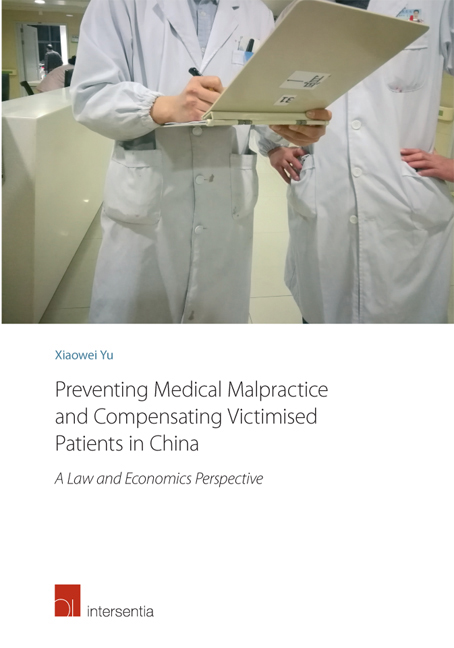 Preventing Medical Malpractice and Compensating Victimised Patients in China
Preventing Medical Malpractice and Compensating Victimised Patients in China Book contents
- Frontmatter
- Acknowledgements
- Contents
- Abbreviations
- List of Figures and Tables
- Chapter 1 Introduction
- Part I Legal Remedies for Medical Malpractice in China
- Introductory Note
- Chapter 2 Health Care Provision and Regulation
- Chapter 3 Compensation for Iatrogenic Injuries under Tort Law
- Chapter 4 Medical Disputes, Iatrogenic Injury, Malpractice Litigation, and Patient Compensation: Empirical Evidence
- Chapter 5 Other Compensation Schemes
- Chapter 6 A Doctrinal Evaluation and Tentative Conclusions
- Part II Economic Theories and Empirical Evidence
- Part III Applying the Economic Observations to China
- Summary
- Bibliography
- Appendix 1 Legislation
- Appendix 2 Cases
- Appendix 3 Semi-Structured Interviews
- Valorisation Addendum
- Curriculum Vitae
Chapter 4 - Medical Disputes, Iatrogenic Injury, Malpractice Litigation, and Patient Compensation: Empirical Evidence
from Part I - Legal Remedies for Medical Malpractice in China
Published online by Cambridge University Press: 29 September 2018
- Frontmatter
- Acknowledgements
- Contents
- Abbreviations
- List of Figures and Tables
- Chapter 1 Introduction
- Part I Legal Remedies for Medical Malpractice in China
- Introductory Note
- Chapter 2 Health Care Provision and Regulation
- Chapter 3 Compensation for Iatrogenic Injuries under Tort Law
- Chapter 4 Medical Disputes, Iatrogenic Injury, Malpractice Litigation, and Patient Compensation: Empirical Evidence
- Chapter 5 Other Compensation Schemes
- Chapter 6 A Doctrinal Evaluation and Tentative Conclusions
- Part II Economic Theories and Empirical Evidence
- Part III Applying the Economic Observations to China
- Summary
- Bibliography
- Appendix 1 Legislation
- Appendix 2 Cases
- Appendix 3 Semi-Structured Interviews
- Valorisation Addendum
- Curriculum Vitae
Summary
INTRODUCTION
After describing the substantive and evidence rules pertaining to medical malpractice claims in China in the previous chapter, this chapter will explore the question of how the Chinese malpractice system actually works in practice (part of Sub-question (1-a)). Specifically, the aim is to figure out the features of medical dispute resolution, the major causes of negligent iatrogenic injuries, the role played by expert witnesses in litigation, the way the court actually handles hard cases, the rate and degree to which victimised patients in fact obtain compensation, the barriers to quick and fair compensation, and finally the actual impact of the law on medical dispute resolution and the behaviour of providers.
To answer the preceding sub-questions, empirical data are indispensable. Although a comprehensive empirical study on the measure of malpractice like the famous Harvard Study in the US has not yet been conducted in China, some scattered empirical studies concerning these issues are currently available.
Several legal scholars and local courts have conducted empirical studies on malpractice litigation and the implications of the expert witness systems for judges and litigants. Although these studies are fairly informative, they are often subject to two limitations. On the one hand, many of them are based on data collected from online case databases. In practice, however, most courts tend to publish only a minority of high-quality decisions online and mediated or withdrawn cases are never reported online. It is thus impossible to see the whole picture of malpractice litigation by merely examining decisions at random published online, no matter how large the number is. On the other hand, many studies carried out by local courts are primarily qualitative, focusing on the application of legal rules rather than on the frequency and size of claims and their potential impact on the prevention of medical errors, and a quarter of these studies were done before 2009. In order to overcome these limitations, in July 2014 I paid a visit to a trial court in China – the Gulou District People's Court (hereinafter the Gulou Court) – and collected a total of 592 decisions concerning medical disputes accepted between 2002 and 2013. All the main findings are presented in Section 2 and their implications, together with that of prior studies, are discussed in Section 3. However, the appellate court of the Gulou Court was not willing to provide appellate decisions.
- Type
- Chapter
- Information
- Preventing Medical Malpractice and Compensating Victimised Patients in ChinaA Law and Economics Perspective, pp. 115 - 172Publisher: IntersentiaPrint publication year: 2017


